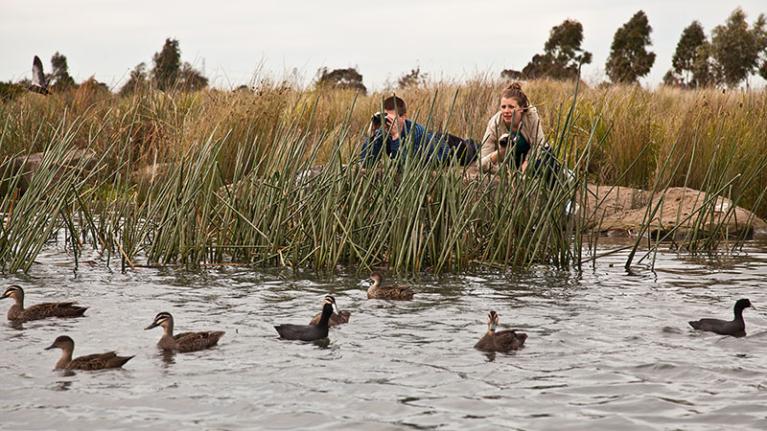Animal research at VU
We protect the wellbeing and quality of life of animals used in teaching and research. Our scientific and learning activities involving animals are underpinned by ethical values and principles.

Definition of an animal
An animal is a live member of a vertebrate species including any fish, amphibian; reptile, bird or mammal, that has passed the mid-point of gestation for the particular species; other than any human being; or a live adult decapod crustacean, that is a lobster; crab; crayfish; or a live adult cephalopod including an octopus; squid; cuttlefish; or a nautilus.
This definition is consistent with the Prevention of Cruelty to Animals Act 1986 and Regulations 1997.
Governing codes of practice
Animal research and teaching ethics at Victoria University (VU) is governed by:
- Australian code for the care and use of animals for scientific purposes 8th edition (2013)
- Code of Practice for the Housing and Care of Laboratory Mice, Rats, Guinea Pigs and Rabbits
- Code of practice for the use of animals from municipal pounds in scientific procedures
- Guidelines to promote the wellbeing of animals used for scientific purposes
- A guide to the care and use of Australian native mammals in research and teaching.
Animal Welfare Policy
Our Animal Welfare Policy provides a framework to ensure the:
- ethical, humane and responsible treatment of animals in all aspects of teaching, learning and research at VU
- ethical and responsible treatment of animal tissue in all aspects of teaching, learning and research at VU
- University is compliant with all relevant statutes, codes and guidelines.
Read the VU Animal Welfare Policy
The University takes its ethical obligations to animals seriously and commits to fulfilling these obligations with respect to all animals used by the University in all aspects of its operations, and in considering the appropriate uses that may be made of animal tissue.
Approval
Approval is required for all animal and animal tissue use in research, teaching and artistic endeavours at VU.
All VU staff or students who propose to undertake work using animals or animal tissue (with the exception of food preparation) are required to lodge an application for approval or notification to the Animal Ethics Committee (AEC).
All applications must be considered and approved by the AEC prior to commencing work.
Why you need approval
VU works towards achieving best practice in animal ethics and welfare.
The review process via the AEC will ensure that research and teaching meets such stringent requirements. The AEC takes into account the 3Rs - Replacement, Reduction and Refinement to ensure the use of animals is justified and all ethical and animal welfare issues have been taken into consideration and are compliant with relevant legislation.
Assessment of animal-based research & teaching at VU
VU's Animal Ethics Committee (AEC) assesses all proposals by researchers and teaching staff that involves scientific research or teaching at the University according to the current edition of the Australian Code for the Care and Use of Animals for Scientific Purposes.
The AEC works to ensure that animal use is justified, weighing the predicted scientific or educational value of the projects against the potential effects on the welfare of the animals. Key to the AECs decision is the consideration to ensuring the minimum number of animals necessary to ensure scientific and statistical validity are to be used, minimising any pain or and where possible using non-animal alternatives.
These principles are termed the three R's (3Rs):
Replacement
There are a number of alternative methods that can be used to replace the use of live animals in either all or part of a project. Replacement may be relative, where animals are still required to provide cells or tissue, but experiments are conducted in vitro. There methods are suited to studies at the tissue or cellular level and can be cost-effective and time saving.
Reduction
The Australian Code for the Care and Use of Animals for Scientific Purposes require that:
- studies are designed to be scientifically and statistically valid
- only the minimum number of animals required to reach the educational objective are used
- studies should not be repeated unless clear justification is provided that this is essential for the purpose or design of the project
- the principle of reduction should not be applied at the expense of greater suffering to individual animals
- the number of animals used must satisfy statistical requirements - if reducing the number of animals makes it impossible to reach a valid conclusion, it would be unethical to proceed with such an experiment.
Refinement
Refinement is any decrease in the incidence or severity of 'inhumane' procedures applied to animals. There are two key issues here:
- to assess the impact of any procedure or condition on the well-being of the animal
- strategies to eliminate or minimise that impact.
Animal ethics training
Animal Ethics training is compulsory for everyone at VU using animals or animal tissue in research or teaching.
The University offers access to various education and training courses on ethics processes, policy and practical aspects of animal use.
For further details please contact the Animal Ethics Committee Secretary via email .